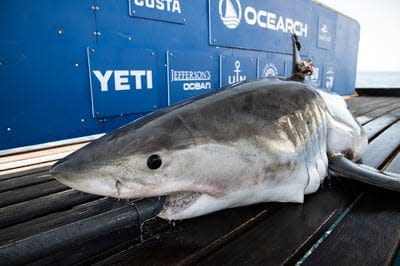Is back! The 10-foot, 3-inch great white shark known to overwinter around Florida has returned to Sunshine State waters.
The shark, nicknamed Penny by OCEARCH scientists who tagged it, splashed off Amelia Island at 9:24 am on Tuesday, December 3.
Ping refers to a satellite tag attached to the animal’s back fin that breaks the surface of the water and transmits location information to its tracker.
According to its tracker, the shark began its journey south on October 6, leaving the Gulf of Lawrence near the Canadian province of New Brunswick in the North Atlantic Ocean and headed south, looking south of the Florida State line from Amelia Island this week. .
Penny frequented Florida last winter and summer during the animal’s first known trip to the Sunshine State since she was tagged by OCEARCH in April 2023.
In 2024, Penny the great white shark:
-
docked at Sarasota Beach on January 11, 2024
-
came off the coast of Amelia Island near Fernandina Beach on April 17, 2024, after leaving the Gulf of Mexico before heading north.
Penny’s Dec. 3, 2024, ping is the first in Florida as North Atlantic great white sharks migrate south to spend the winter in warmer waters with more food, including around Florida and the Gulf of Mexico.
Here’s what to know about Penny, the non-profit group OCEARCH and great white sharks in Florida.

Penny, a female great white shark, was 10 feet, 3 inches long and weighed 522 pounds when she was tagged off Ocracoke, North Carolina, in April 2023.
What you need to know about the white shark Penny
Penny, a juvenile female great white shark, measured 10 feet 3 inches and weighed 522 pounds when she was tagged on April 23, 2023, off Ocracoke, North Carolina.
As of December 6, 2024, the shark has traveled 8,898 miles since then.
Penny was the 92nd great white shark tagged by OCEARCH in the Western North Atlantic and was named after friends of the group at the Salty Penny Canvas in Morehead City, North Carolina.
How many sharks has OCEARCH tagged?
As of November 20, 2024, according to the OCEARCH shark tracker, the group has tagged 373 sharks, with great white sharks leading the pack:
-
3 large hammerhead sharks
The group also tagged alligators, dolphins, seals, swordfish and turtles.
What does OCEARCH do for great white sharks?
OCEARCH is a non-profit research organization that studies ocean giants.
The group studies large reef species, including great white sharks, that are important to the health of the oceans.
“At OCEARCH, we are on a mission to solve the Global White Shark Puzzle. There are nine populations of white sharks worldwide and OCEARCH’s goal is to help regional scientists better understand the lives of white sharks in each of these populations,” the group’s website says.
During the visit, researchers gathered previously unavailable data on animal movements, reproductive cycles, genetic makeup, diet, abundance, and more.
“If we lose a predator (shark) we lose all our fish and then no fish sandwiches for our grandchildren,” OCEARCH founder Chris Fischer told the Courier Journal. “That’s oversimplified, but the point is important because many shark species are threatened by fishing and the demand for shark fins in Asia. Their declining numbers threaten marine habitats.”
Great white shark indeed
Here are some things to know about white sharks, according to NOAA Fisheries:
-
White shark grows slowly. Males mature at the age of 26 and females at 33. Life is difficult to know but it is estimated to be between 30 and 70 years.
-
White sharks are about 4 feet long at birth but can grow to about 20 feet in length and weigh 4,000 pounds.
-
White sharks eat a rich diet of fish, invertebrates and marine animals.
-
White sharks are warm-blooded and can maintain an internal body temperature above that of the surrounding water. This allows them to be more active in cooler water than cold-blooded species.
Great white shark in Florida
Great white sharks migrate south when the water is cold and food is scarce up north, according to OCEARCH chief scientist Dr. Bob Hueter.
Think of them as the snowbirds of sharks.
Most of them tend to live offshore in the waters of continental shelves, Hueter said.
5 shark attacks in Florida in summer 2024
Florida has seen several shark bites this summer:
There were 69 recorded unsanitary shark attacks around the world in 2023, according to the International Shark Attack File. The US led the world with 36 attacks and Florida was also the worst bitten state at 16, with no fatalities. A great white shark has not been seen in a Florida shark bite since 1926.
Florida shark attacks in 2023:
-
Florida: 16 bites, none kills
-
Hawaii: 8 bites, 1 fatal
-
New York: 4 bites, none kills
-
California: 2 bites, 1 kills
-
North Carolina: 3 bites, none fatal
-
South Carolina: 2 bites, none kills
-
New Jersey: 1 bite, nothing fatal
Although the US is the most attacked, South Africa has the highest number of shark deaths.
Support local journalism by subscribing to a Florida news agency
This article originally appeared on the Florida Times-Union: 10-ft great white shark ‘Penny’ back in Florida, OCEARCH tracker shows.